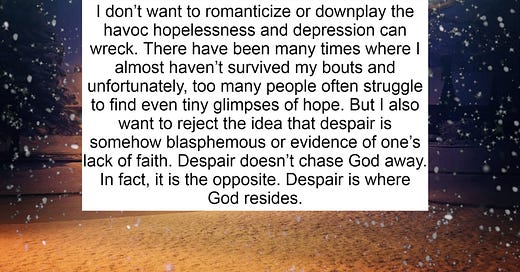Advent Week 1: The Hope Found in Despair
Jeremiah 33:14-16
33:14 The days are surely coming, says the LORD, when I will fulfill the promise I made to the house of Israel and the house of Judah.
33:15 In those days and at that time I will cause a righteous Branch to spring up for David; and he shall execute justice and righteousness in the land.
33:16 In those days Judah will be saved and Jerusalem will live in safety. And this is the name by which it will be called: "The LORD is our righteousness."
The hope behind Advent comes from the notion that God is a God that fulfills their promises. God promised that God would be with us. Jesus is God’s physical embodiment of the promise to never leave us alone and to journey with us through life.
Jesus is also proof that we can trust that God will fulfill God’s other promises: promises of a world where death and injustice are no more. A world where war is a thing of the past. A world where we don’t need to shout Black Lives Matter, because it will already be so. A world where Black and brown people will not have to fear for their lives when they go for a job, or go for a drive, or step inside their houses.
A world where each person has shelter and enough food to eat. A world where sickness and death are nightmares: vividly remembered but not real. A world that invests more in peace and new life, rather than in war and worldwide destruction. Jesus’s birth is just the beginning of God’s kingdom breaking into this world. The here and the not yet.
Despair is often presented as the opposite of hope and faith. I remember hearing constantly as a child, “the opposite of faith isn’t doubt, it’s despair.” Despair was a dirty word. It signified faithlessness. Doubt, at least, signified a willingness to question and an openness to God revealing God’s self, but despair was presented as almost blasphemous. I was told via the church I attended, and the evangelical shows I watched that God could handle doubt-but not despair.
But as an adult, I reject that premise. To me hope and despair, go hand in hand. I don’t necessarily think despair cancels out hope, though it may make it harder to see. I mean, can you know the beauty and power of hope without walking through the pits of despair? Can you know how life-sustaining and necessary hope is, without having experienced how life extinguishing and painful despair is?
Like too many people, I know the type of despair that comes from mental illness and childhood trauma. Growing up in an emotionally neglectful and abusive home environment led to maladaptive coping mechanisms that helped me survive but also fueled my despair. Growing up, well into my 20s, suicidal thoughts were a daily struggle. Even now, when I am doing much better, occasionally I am blindsided and overwhelmed by a deep sense of hopelessness that makes waking up in the morning painful.
This type of anguish is difficult to explain to those who’ve never experienced it. On the outside, those of us who struggle with suicidal thoughts often come across as simply self-absorbed and overdramatic. We are simply negative Nancy’s who never have anything positive to say or think. And to be fair, people can only see what we project and how we act. They can’t see the deep pain that makes daily life a type of living hell.
However, it has been in those moments, where I’m absolutely convinced that nothing could get better, that spots of hope managed to break though. And when that happened, I held onto that hope as if my life depended on it because it often did. I held onto the adorable smile and laugh of a toddler, and her baby brother’s attempts to say my name. I clung to the words of a good sermon, that told me to remember God’s promise to be with me always. I treasured the ecstatic reception I received from a dog, that was just soooo excited to me and to be petted. Sometimes the only hope I had to keep me going for another day was a nice hot cup of chocolate or freezing cold sweet tea.
During the good times, during the times where everything seems to be going my way, hope seems superfluous. It’s seen as just another commodity taken for granted. It’s only when everything feels wrong when happiness seems to be a cruel illusion, does hope matter.
Advent reminds me that hope and despair often co-exist. The despair of how things are-the injustice, the death, the sorrow, co-exists with the hope that God’s presence brings to the world. The hope that recognizes God’s presence in the midst of profound suffering and the promise that this suffering will not last forever.
I don’t want to romanticize or downplay the havoc hopelessness and depression can wreck. There have been many times where I almost haven’t survived my bouts and unfortunately, too many people often struggle to find even tiny glimpses of hope. But I also want to reject the idea that despair is somehow blasphemous or evidence of one’s lack of faith. Despair doesn’t chase God away. In fact, it is the opposite. Despair is where God resides.
Note: If you enjoy my writing and work, please consider supporting me! My paypal is: paypal.me/NaiomiGonzalez Please note the unique spelling of my first name.



